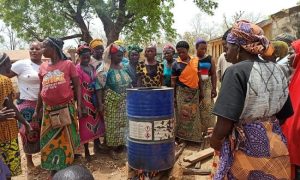The Nigerian Conservation Foundation (NCF), in partnership with the Canadian High Commission’s Canada Fund for Local Initiatives, has embarked on activities to tackle climate change in the grassroot communities of River Kampe National Park, Kwara State.

The objectives of the project are: Building resilience for three vulnerable support zone communities to the impact of climate change through nature-based solutions; Empowering three support zone communities especially women on alternative energy source through the production of Biochar/Briquette from agriculture waste; and Developing a Nature-based Recovery Action Plan for River Kampe National Park towards restoring its over 65,000 hectares of forest landscape through a community-led approach.
As part of the project activities, NCF has trained 50 women and youth from the various communities on Biochar production from rice waste.
The training covered production, packaging, use, and marketing of briquette and contributes in three key areas, which include: Energy security by developing alternative and sustainable energy source for the communities, thereby dissuading them from cutting down trees for firewood; Climate change mitigation from reduction in emissions of greenhouse gases; and Economic development with the improvement of livelihoods of over 10,000 inhabitants of these rural areas especially women and youth through fruits and biochar enterprise.
Participants in this biochar training were also organised into community biochar women cooperative group where they will have access to seed funding to set up the biochar enterprise in the beneficiary communities – Agboro, Latayi, and Koro in Pategi Local Government Area of Kwara State.
Earlier in January, NCF kicked-off the Nature-based recovery and climate resilience project around River Kampe Forest Reserve with a community need and attitude assessment as well as the establishment of Site Support Groups in the three communities. This resulted into understanding the need of the community around household energy, unemployment, knowledge gap in biodiversity monitoring which informed the design and implementation of the project.
NCF has established three native/economic tree nursery across the three target communities with the planting of locust beans and cashew tree seeds. The group said that its goal of raising 15,000 native economic seeds has been achieved while the communities will lead the planting of these seedlings by the onset of raining season in April across their agrological landscapes.
In the long term, NCF will be increasing the number of seedlings raised to about one million seedlings over the next two years. These fruit trees would provide long term healthy nutrition, economic and environmental support for these communities to address biodiversity loss and climate change.
On the Key Biodiversity Area training conducted, NCF organised a capacity building workshop on wildlife monitoring, data collection, recording, and reporting for 30 forest officers and youth selected from these communities who will become Site Support Groups. This Site Support Group in addition to job employment will help the Kwara State Ministry of Environment close the biodiversity data gap already identified in River Kampe and be able to plan for its long-term conservation action.
River Kampe Forest Reserve is a forest reserve located at Pategi, Kwara State. Despite the Federal Government’s intervention to upgrade River Kampe Forest Reserve (RKFR) to a National Park, there remains unsustainable practices within the three Support Zone Communities.
The Forest Reserve, important for safe drinking water to over 1 million people in the area, supports irrigation for crop and livestock farming, but lacks sustainable management practice. Threats of unlawful timber exploitation in buffer zones of the Forest Reserve, wildlife poaching, and production of charcoal by merchants persist. These communities do not benefit much from these forest resources with high levels of unemployment among women and youth and continuous exposure to the impacts of drought and desertification on food security.
These challenges and others necessitated NCF and its partner to develop a strategic project that can directly impact the lives of the host communities’ members.
However, in collaboration with the Kwara State Ministry of Environment, NCF is organising a Stakeholders Workshop to commemorate the International Day of Forest on March 23, 2022, in Ilorin, Kwara State.
